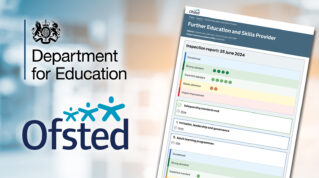The breadth of experiences relating to Ofsted inspections are vast. No two providers share the same experience other than the passion! For some, the passion relates to extreme elation and delight about every aspect and for others frustration, relief, exhaustion or devastation.
Since Ofsted launched its Big Listen, members of the Fellowship of Inspection Nominees (FIN) from across the sector have been feeding in proposals for reform. Starting with the dreaded phone call that an inspection is imminent, nominees are adamant that five days’ notice should be given to providers of all sizes.
This is particularly important for work-based learning where the provider has to liaise quickly with employers and apprentices. They also want an end to Friday notification calls from Ofsted because this will avoid the need to contact employers and learners over the weekend.
Providers believe that inspection reports are sanitised and lack either the detail about strengths or insufficient information to expand on the areas for improvement. Where ‘Requires Improvement’ (RI) has been the overall judgement, the outcome could be in sharp contrast to the learner and employer feedback in Ofsted’s surveys, which are not published. This leaves providers feeling very unfairly represented.
FIN members have suggested one of two ways forward: that Ofsted produces two reports, including a private one for the provider (and the funder) with more specific details, strengths, areas for improvement and most importantly recommendations to improve, or alternatively that Ofsted publishes a richer, more meaningful report that shows survey outcomes and other elements of provision.
For providers awarded RI or ‘Inadequate’, improvement recommendations are essential, especially for independent learning providers who will need to show how they can meet them to keep trading.
Over half of the respondents to FIN’s Big Listen survey felt that the size of their inspection team was not appropriate for their provision. For some larger providers, the team’s size limited the learner sample size and therefore some of the negative findings were disproportionate. On the other hand, one provider was allocated a team of six inspectors to look at just 116 learners.
Emotions run high and the sense of urgency is overwhelming
Ofsted should therefore provide clarity on the rationale for the number of inspectors or learner sample sizes, for instance by stipulating the number of learners and employers or a percentage that constitutes a sample to help providers with their preparation process.
Even if these issues are addressed, we still need to tackle the poor alignment of the provider contract for delivery and the inspection framework (EIF). Ofsted is generally valued by the sector for its professionalism and ability to make fair judgments, but inspectors are limited to only judging against the framework.
FIN looks at reports by provider type and the number of sixth form colleges achieving ‘Outstanding’ is extremely high and disproportionate to all other types of provider. Our research of ‘Outstanding’ outcomes shows a clear correlation with the requirements of the EIF: a fixed term time and a full-time education programme which includes a pastoral curriculum, selective entry and a well-established exam system. By contrast, adult education short courses, apprenticeships and bootcamps are being shoehorned into the EIF.
We are not trying to devalue the richness of provision that Ofsted reports on, but as the grades are business-critical for so many contracts, there needs to be a different approach. The EIF should be streamlined to reflect different types of provision. Reform should follow the principle that if it’s paid for, it should be graded; if it is not in the contract and therefore not funded, don’t grade.
A highly technical apprenticeship provider should not be prevented from achieving ‘Outstanding’ because they do not spend precious off-the-job hours promoting healthy eating or personal fitness. The judgement should be primarily focused on the technical training, potentially fantastic career progression and valued output into the employer’s business.
As FIN continues to gather nominees’ feedback and form judgements for submission into Ofsted’s consultation, emotions run high and the sense of urgency is overwhelming. Change is needed fast.















I agree with the article, thank you Kerry. We are currently caught in the revolving door of policy change about whether Ofsted should continue to make a single word judgement about overall effectiveness and, if not, with what to replace it. Although very recent statements indicate they will be kept.
In my own experience as a former HMI; I, and many of my colleagues, believe there is no merit in reducing, for example, a large and complex college with tens of thousands of learners, to a single word judgement. Indeed, it is rather audacious to say that is possible. This also applies to the single word judgements about each element of the EIF. All equally very blunt tools. There is precedent for removing a single word judgement. Many years ago, Ofsted stopped grading, with a single word judgement, individual lesson observations. The reasoning for doing that applies equally to single word judgements for overall effectiveness and other aspects of the provision.
Moving forward there would be more value in inspectors reporting on the provider’s history of change and how well it adapted to changes in society, the workforce and its environment. Is the provider agile? Do they have a sufficiently flexible structure to respond to change? Can the provider demonstrate how they adapt to the demands of employers and changing demographic of learners? This approach would provide the sector with a far better picture of a provider’s overall effectiveness than just a single word judgement.